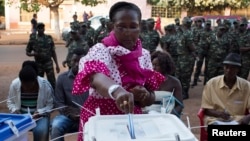Voters in Guinea-Bissau stood in long lines Sunday to pick a new president and parliament, the country's first election since a military coup two years ago disrupted a presidential race as it headed to a second-round runoff.
The 2012 coup leader, Antonio Indjai, released two doves as a sign of peace after he voted, but declined to comment on the balloting.
Authorities say about 95 percent of potential voters registered. But election officials say there has not been much of an education campaign about new voting procedures and how to use the new biometric voter cards.
There are 13 presidential candidates, with no clear front-runner. Political analysts say they expect the vote to go to a second round.
Fifteen parties are running for parliamentary seats.
Guinea-Bissau is one of Africa's smallest, yet most unstable, countries. There have been repeated coups, mutinies and political assassinations since independence 40 years ago from Portugal. No elected president has ever finished his mandate.
Analysts warn that the military remains a destabilizing force.
The 2012 coup leader, Antonio Indjai, released two doves as a sign of peace after he voted, but declined to comment on the balloting.
Authorities say about 95 percent of potential voters registered. But election officials say there has not been much of an education campaign about new voting procedures and how to use the new biometric voter cards.
There are 13 presidential candidates, with no clear front-runner. Political analysts say they expect the vote to go to a second round.
Fifteen parties are running for parliamentary seats.
Guinea-Bissau is one of Africa's smallest, yet most unstable, countries. There have been repeated coups, mutinies and political assassinations since independence 40 years ago from Portugal. No elected president has ever finished his mandate.
Analysts warn that the military remains a destabilizing force.





